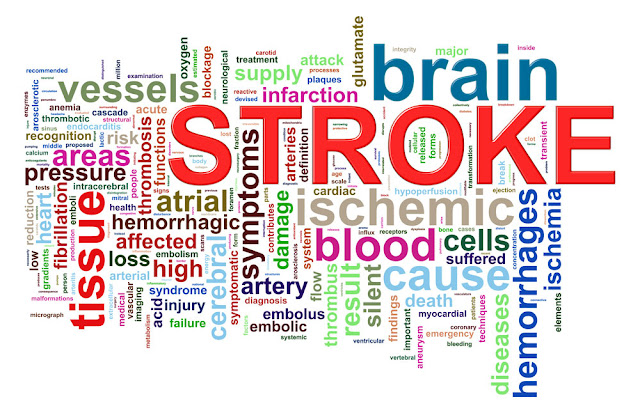Stroke, sometimes called a "brain attack," happens when blood flow is
cut off to a part of the brain, stopping
the cells from getting the oxygen they need to live. Brain cells may recover, but after a few
minutes, they could die, resulting in permanent damage.
·
Approximately
800,000 people have a stroke each year; about one every 40 seconds
·
Strokes
occur due to problems with the blood supply to the brain, either the blood
supply is blocked or a blood vessel within the brain ruptures, causing brain
tissue to die.
·
A
stroke is a medical emergency, and treatment must be sought as quickly as
possible
·
Types
and causes of stroke:
·
Ischemic
stroke- It happens when a blood vessel that takes blood to your brain gets blocked. Often, it's by a blood
clot that travels from one part to another part of the body. For example, fatty
deposits in arteries can break off, flow to the brain,
and cause blood clots. It is the most common type of stroke
·
Hemorrhagic stroke-happens when a blood vessel in the brain
bursts and bleeds, which can damage the tissue. They're less common but more
serious. Uncontrolled High
Blood Pressure and
over-using blood thinners can lead to this kind of stroke.
·
Transient ischemic
attack (TIA)- It is
a "mini stroke" from a temporary blockage. Although it doesn't cause
permanent brain damage, it may cause stroke symptoms that could last minutes or hours
Risk factors of stoke:
There are many conditions which can increase the risk of having a
stroke, it may include:
- Atrial fibrillation (AFib)
- Blood disorders, such as sickle cell disease or severe anemia
- Diabetes
- Hardened arteries (also called atherosclerosis)
- Heart disease
- High blood pressure (also called hypertension)
- High cholesterol
- Being overweight or obese
- Coronary artery disease, heart failure and enlarged
heart may increase the risk
- Stroke is more common in
older age than in younger age
- Family history may be other
greatest risk factor
- A man is at a higher risk to
get stroke than a women
Symptoms of stroke:
- Confusion, including trouble
with speaking and understanding
- Headache, possibly with altered
consciousness or vomiting
- Numbness of the face, arm or
leg, particularly on one side of the body
- Trouble with seeing, in one
or both eyes
- Trouble with walking,
including dizziness and lack of co-ordination.
Diagnosis of stroke:
Stroke is a medical emergency,
with the appearance of symptoms, a patients must be shifted to hospital as fast
as possible. Certain diagnosis includes:
- Physical examination: A
doctor will ask about the patient's symptoms and medical history. They may
check blood pressure, listen to the carotid arteries in the neck and
examine the blood vessels at the back of the eyes, all to check for
indications of clotting
- Blood tests: A doctor may
perform blood tests in order to find out how quickly the patient's blood
clots, the levels of particular substances (including clotting factors) in
the blood, and whether or not the patient has an infection
- CT scan: A series of X-rays that
can show haemorrhages, strokes, tumours and other conditions within
the brain
- MRI scan: Imaging of the brain to
detect damaged brain tissue
- Carotid ultrasound: An ultrasound scan to check the blood flow of
the carotid arteries and to see if there is any plaque present
- Cerebral angiogram: Dyes are injected into the
brain's blood vessels to make them visible under X-ray, in order to give a
detailed view of the brain and neck arteries
- Echocardiogram: A detailed image of the
heart is created to check for any sources of clots that could have
traveled to the brain to cause a stroke.
Treatment of stroke:
·
In case of ischemic stroke:
· Treatment can begin with drugs to break down clots and
prevent further ones from forming.
· Aspirin can be given, as a Tissue
plasminogen activator (TPA). TPA is very effective at
dissolving clots but needs to be injected within 4.5 hours of stroke symptoms
manifesting themselves.
· In case of emergency, TPA is directly pushed in the artery
of the brain usinga catheter, or using a catheter to physically
remove the clot
In case of hemorrhagic stroke:
· Treatment can begin with drugs being given to
reduce the pressure in the brain, overall blood pressure, prevent seizures and
prevent sudden constrictions of blood vessels.
· Surgery can be used to remove
small arteriovenous
malformations (AVMs) if they are not too big and not too deep within the
brain. AVMs are tangled connections between arteries and veins that are weaker
and burst more easily than other normal blood vessels
· Surgery can be used to repair
any problems with blood vessels that have led or could lead to hemorrhagic
strokes.
Rehabilitation programmes:
· Speech therapy - To help with
problems producing or understanding speech. Practice, relaxation and changing
communication style, using gestures or different tones
· Physical therapy - To help a
person relearn movement and co-ordination
· Occupational therapy
- To help a person to improve their ability to carry out routine daily
activities, such as bathing, cooking, dressing, eating, reading and writing
· Joining a support group - to
help with common mental health problems such as depression that can occur
after a stroke.
· Support from friends and
family – To provide practical support and comfort. Letting friends and family
know what can be done to help is very important.

